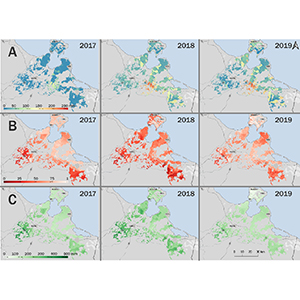 Smart Citations
Smart CitationsSee how this article has been cited at scite.ai
scite shows how a scientific paper has been cited by providing the context of the citation, a classification describing whether it supports, mentions, or contrasts the cited claim, and a label indicating in which section the citation was made.
Assessment of drought stress in arid olive groves using HidroMORE model
The olive tree is well known for being adapted to the arid conditions of the Mediterranean basin. However, prolonged drought periods which are expected to become more frequent because of climate change could result in severe water stress. In order to map the spatial distribution of drought stress in the olive groves in the arid regions of southeastern Tunisia (governorate of M denine), we made recourse to the HidroMORE model (based mainly on FAO56 ET, NDVI from Sentinel 2 images and other physical parameters) to compute the water balance in a GIS environment. The outputs were compared to in situ soil water content measurements in four selected sites representing the various agro-ecological zones (mountains, piedmont, inner plain and coast) of the study site during the observation period from January 2016 to December 2019. The model outputs performed relatively well (the overall correlation coefficient R2=0.72; index of agreement IA=0.76). The simulation results show that during normal years or average droughts, the water stress is least in the mountain and piedmont zones because of the additional runoff water supplied by the traditional water harvesting structures (Jessour and Tabias) and in the coastal zone, thanks to the higher air humidity and rainfall. In contrast, the olives in the inner plains are the most affected. Nevertheless, in case of severe droughts, the stress is generalised. Thus, the model could be used as a decision tool for prioritizing areas of intervention for drought control and mitigation (supplemental irrigation for trees safeguard, etc.)
Downloads
How to Cite

This work is licensed under a Creative Commons Attribution-NonCommercial 4.0 International License.
PAGEPress has chosen to apply the Creative Commons Attribution NonCommercial 4.0 International License (CC BY-NC 4.0) to all manuscripts to be published.

 https://doi.org/10.4081/jae.2022.1264
https://doi.org/10.4081/jae.2022.1264





